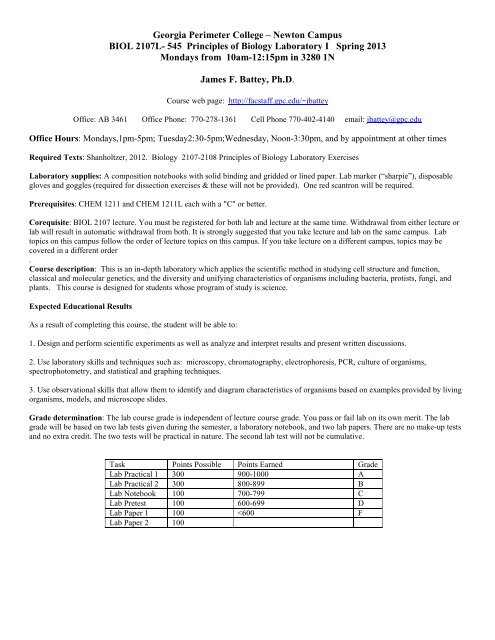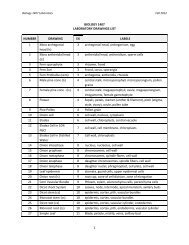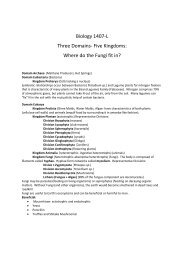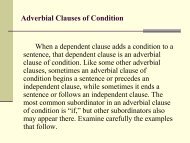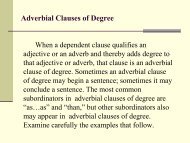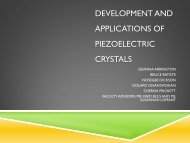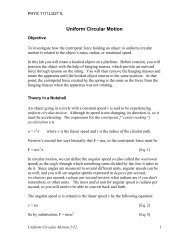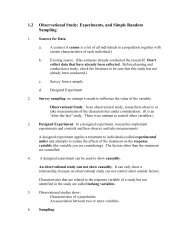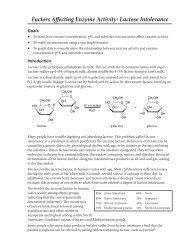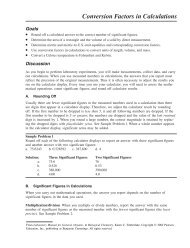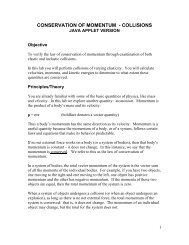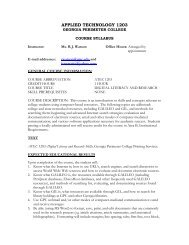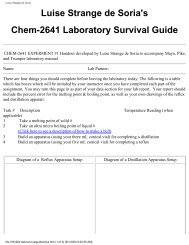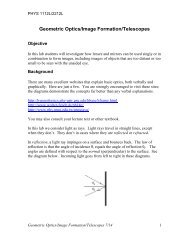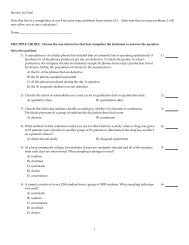Georgia Perimeter College â Newton Campus - Faculty & Staff ...
Georgia Perimeter College â Newton Campus - Faculty & Staff ...
Georgia Perimeter College â Newton Campus - Faculty & Staff ...
Create successful ePaper yourself
Turn your PDF publications into a flip-book with our unique Google optimized e-Paper software.
<strong>Georgia</strong> <strong>Perimeter</strong> <strong>College</strong> – <strong>Newton</strong> <strong>Campus</strong>BIOL 2107L- 545 Principles of Biology Laboratory I Spring 2013Mondays from 10am-12:15pm in 3280 1NJames F. Battey, Ph.D.Course web page: http://facstaff.gpc.edu/~jbatteyOffice: AB 3461 Office Phone: 770-278-1361 Cell Phone 770-402-4140 email: jbattey@gpc.eduOffice Hours: Mondays,1pm-5pm; Tuesday2:30-5pm;Wednesday, Noon-3:30pm, and by appointment at other timesRequired Texts: Shanholtzer, 2012. Biology 2107-2108 Principles of Biology Laboratory ExercisesLaboratory supplies: A composition notebooks with solid binding and gridded or lined paper. Lab marker (“sharpie”), disposablegloves and goggles (required for dissection exercises & these will not be provided). One red scantron will be required.Prerequisites: CHEM 1211 and CHEM 1211L each with a "C" or better.Corequisite: BIOL 2107 lecture. You must be registered for both lab and lecture at the same time. Withdrawal from either lecture orlab will result in automatic withdrawal from both. It is strongly suggested that you take lecture and lab on the same campus. Labtopics on this campus follow the order of lecture topics on this campus. If you take lecture on a different campus, topics may becovered in a different order.Course description: This is an in-depth laboratory which applies the scientific method in studying cell structure and function,classical and molecular genetics, and the diversity and unifying characteristics of organisms including bacteria, protists, fungi, andplants. This course is designed for students whose program of study is science.Expected Educational ResultsAs a result of completing this course, the student will be able to:1. Design and perform scientific experiments as well as analyze and interpret results and present written discussions.2. Use laboratory skills and techniques such as: microscopy, chromatography, electrophoresis, PCR, culture of organisms,spectrophotometry, and statistical and graphing techniques.3. Use observational skills that allow them to identify and diagram characteristics of organisms based on examples provided by livingorganisms, models, and microscope slides.Grade determination: The lab course grade is independent of lecture course grade. You pass or fail lab on its own merit. The labgrade will be based on two lab tests given during the semester, a laboratory notebook, and two lab papers. There are no make-up testsand no extra credit. The two tests will be practical in nature. The second lab test will not be cumulative.Task Points Possible Points Earned GradeLab Practical 1 300 900-1000 ALab Practical 2 300 800-899 BLab Notebook 100 700-799 CLab Pretest 100 600-699 DLab Paper 1 100
Lab Notebooks: A brief introduction, statement of the purpose, and a summary of the main points for each week's exercises,including what you think you should see, will be written in your notebook before lab and brought to class. The results will be recordedin lab as you perform your experiments and make your observations. A short discussion analyzing the results is to be written whenyou finish the exercise.Lab Reports: You will submit two formal laboratory reports. The format is detailed in your lab manual. Submissions are throughTurmitin.com. Your course ID and password will be distributed in lab.Attendance policy1. You can only attend the lab you are registered for.2. Attendance will be taken in each lab session. Each missed lab will result in a 33 point penalty (out of your 100 point total),up to a maximum of 99 points).3. Students who miss lab exercises perform very poorly in this course. The primary objective of any lab course is to provide thestudent with a “hands-on” experience that will support and illustrate the concepts covered in the lecture portion of the course.Lab is about seeing and doing. Therefore, consistent and timely attendance to lab is a must for success in this course!4. There will be no make-up lab exercises. Due to logistical and safety concerns, “wet labs” (labs requiring the use ofequipment, chemicals, solutions, etc) cannot be made up. Any grades collected during the missed class, such as quizzes,cannot be made up and will be recorded as a zero. If a student misses a laboratory exercise, the exercise cannot be used for alaboratory report. Students are responsible for any information covered in their absence.5. Lab will start promptly at the scheduled time. Important introductory and safety information will be given at the beginningof each lab. Late arrival to lab will affect your understanding of the entire lab exercise and may pose a safety hazard to youand other students. If a quiz is given at the beginning of the lab, a student arriving late will not be allowed to take the quiz.6. The "practical" format of lab exams makes "make-up exams" difficult to arrange and administer; each student should makeevery effort possible to be on time for lab exams. However, in the event of a verifiable illness or emergency students shouldcontact the instructor by the date of the exam. A comprehensive final may be given at the end of the term to compensate forthe missed exam.7. Students must be on time for their scheduled exams. Students entering after the exam has begun may not be allowed tofinish.Academic honesty policyCheating includes any attempt to defraud, deceive, or mislead the instructor in arriving at an honest grade assessment.Plagiarism is a form cheating that involves presenting the ideas or work of another as your own. Cheating includes, but is not limitedto:1. On a test or quiz: looking at or copying from another student’s work, allowing another student to copy your work,exchanging written or oral communication, using notes, or opening a text book.2. On out-of -class assignments (including lab reports): copying from another student or printed source without citation, havinganother person do your work, or allowing another student to use your work as his/her own.3. Providing false documentation in order to be allowed to make up a missed test or assignment or to document an excusedabsence. A first offense violation of the cheating policy will result in a grade of zero for the assignment in question.A second offense will result in assignment of an “F” grade for the course and a formal charge of academic dishonesty will belodged with the <strong>Campus</strong> Dean for Student Services. Polices have been established by <strong>Georgia</strong> <strong>Perimeter</strong> <strong>College</strong> to insure due processin charges of cheating or plagiarism. A copy of these procedures can be found in the Student Handbook.
Laboratory safety policies and procedures<strong>Georgia</strong> <strong>Perimeter</strong> <strong>College</strong> has a uniform set of lab safety guidelines that are enforced in all lab courses on all campuses. You mustreview these lab safety guidelines online at your lab web page http://facstaff.gpc.edu/~jbattey, print the contract (first page only),complete it and turn it in at the second lab meeting.General Lab Guidelines1. No smoking, drinking, or eating in the laboratory.2. Bare feet and open toe shoes are not permitted in the laboratory3. Wear goggles and/or gloves if instructed.Chemical safety1. Some chemicals used in this laboratory may be absorbed by contact lenses. It is advisable to remove contacts before lab orwear tight fitting goggles during lab exercises that will involve these chemicals.2. Dispose of all chemical waste in the proper waste container. NEVER pour any chemical down the sink without permissionfrom your instructor.3. Do not taste chemicals or pipette solutions by mouth.4. In the event of any accident, notify the instructor immediately. Do not attempt to clean up broken glass or spilled chemicalsyourself.5. Students with special conditions (pregnancy, nursing mothers, allergies, depression of immune system through such things asdisease, chemotherapy, transplants, etc.) should be aware that science laboratories contain materials which, if handledimproperly, may have a hazardous effect on them. These students should contact their doctor for advice about continuing inthe laboratory. Students who wish to withdraw from a laboratory after consultation with their doctor should submit a letterfrom the physician within the first two weeks of class indicating that the student should not continue in the laboratory due toa health risk. Information about the chemical compounds used in science laboratories is available from the lab coordinatorBiohazard safety1. Any contaminated items (toothpicks, sheep blood, swabs) must be placed into the appropriate disposal container.2. Bandage all cuts on hands before handling preserved specimens or using chemical reagents.3. Do not use the microscope if you have an eye infection.4. No lab material of any kind may leave the laboratory.5. Wash hands before leaving the laboratory.Equipment usage and safety1. Care should be taken when handling and using microscopes. Always carry a microscope with both hands.2. All microscopes must be returned to the proper cabinet at the end of the class period with the cord properly wrapped and thedust cover in place.3. Be cautious when using hot plates. Assume that any hot plate on a bench or table is still hot and do not pick it up.4. Desk areas should be kept uncluttered.5. Make sure that water faucets and hot plates are turned OFF before leaving lab.6. It is the responsibility of the student to clean up the laboratory at the end of the lab period. All materials should be returnedto the proper location. Glassware and instruments should be cleaned and dried. Chairs should be pushed under the tables.Americans with Disabilities Act statement: If you are a student who is disabled as defined under the Americans with DisabilitiesAct and requires assistance or support services, please seek assistance through the Center for Disability Services. A CDS Counselorwill coordinate those services.Equal opportunity statement: No person shall, on the grounds of race, color, sex, religion, creed, national origin, age, or disability,be excluded from employment or participation in, be denied the benefits of, or otherwise be subjected to discrimination under anyprogram or activity conducted by GPC.The Regents’ Test: The University of <strong>Georgia</strong> requires that all students enrolled in undergraduate degree programs in the UniversitySystem institutions (including <strong>Georgia</strong> <strong>Perimeter</strong> <strong>College</strong>) successfully complete all parts of a competency examination in reading andEnglish composition. This competency examination is commonly called “the Regent’s Test”, and it is free of charge. A student hastwo attempts to pass this test before accumulating 45 hours of collegiate credit. Please sign up for the Regent’s Test when you enrollin English 1102. Do this in time to have two attempts before accumulating 45 credit hours.Affirmative action statement: <strong>Georgia</strong> <strong>Perimeter</strong> <strong>College</strong> adheres to affirmative action policies designed to promote diversity andequal opportunity for all faculty and students.
Biology 2107L - 545 Laboratory Schedule<strong>Georgia</strong> <strong>Perimeter</strong> <strong>College</strong> – <strong>Newton</strong> <strong>Campus</strong> Spring 2013Mondays from 10am-12:15pm in 1N-3280Week Date Lab Exercise Chapter1 Mon 7 Jan Lab Introduction and Lab Safety, TheMicroscope, and The CellCD2 Mon 14 Jan “Monera” and “Protista” Q, R3 Mon 21 Jan Martin Luther King Holiday, No lab4 Mon 28 Jan Scientific Method A5 Mon 4 Feb Organic Molecules B6 Mon 11 Feb Fruit Fly Genetics startCell DivisionMitosis in Plant Root TipHFG7 Mon 18 Feb Egg Osmosis E8 Mon 25 Feb Fruit Fly Genetics finishHuman GeneticsHI9 Mon 4 March Spring Break, no lab10 Mon 11 March Lab Practical 1DNA Restriction Enzyme StartK11 Mon 18 March DNA and Restriction Enzymes finishAlu insertion polymorphism startKL12 Mon 25 March Alu insertion polymorphism finishGenetic Control using Serratia startLN13 Mon 1 April Genetic Control using Serratia finishEnzymesNM14 Mon 8 April Aerobic Respiration P15 Mon 115 April PhotosynthesisTerrestrial Plant Adaptations to LandEvolution of Terrestrial PlantsOTU16 Mon 22 April Lab Practical 2Content schedule may be modifiedWednesday 28 February is midpoint, last day to drop without receiving WF


